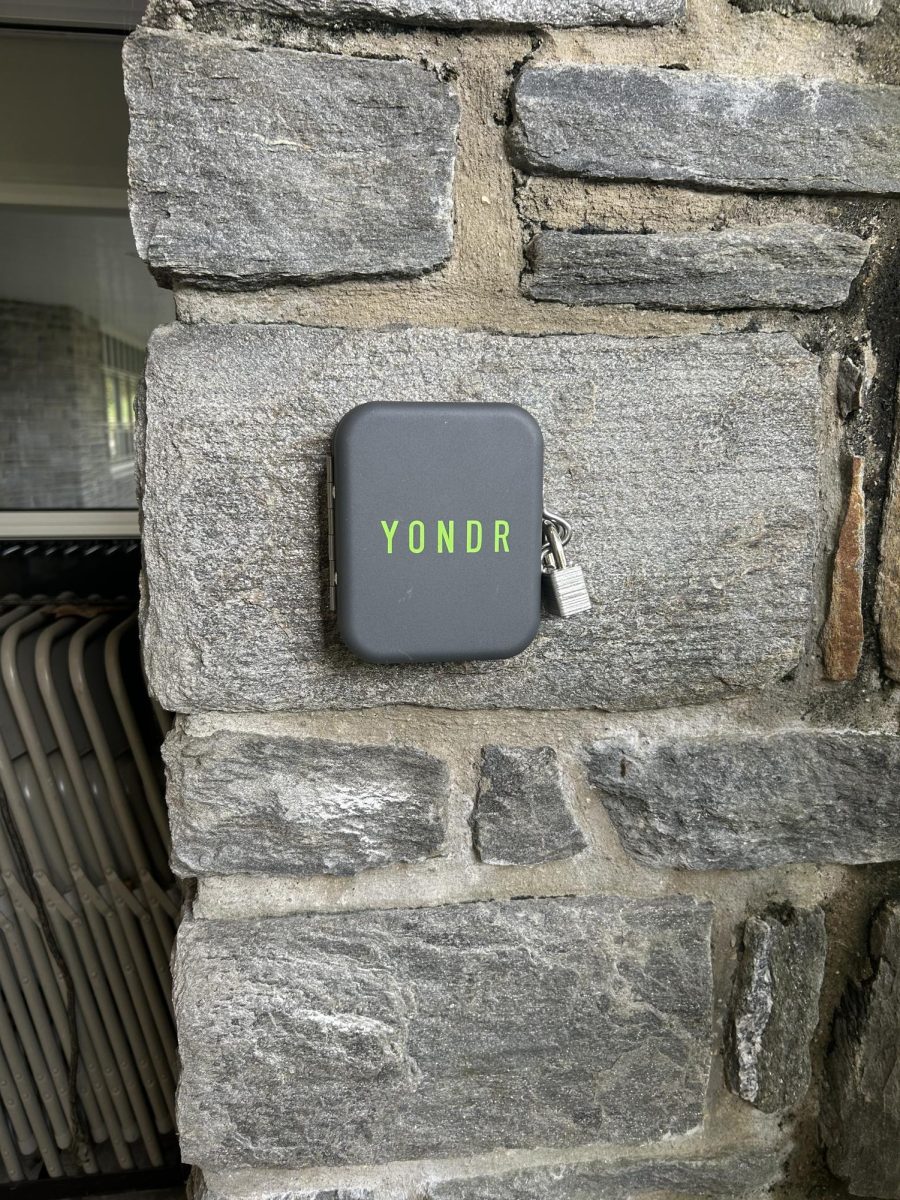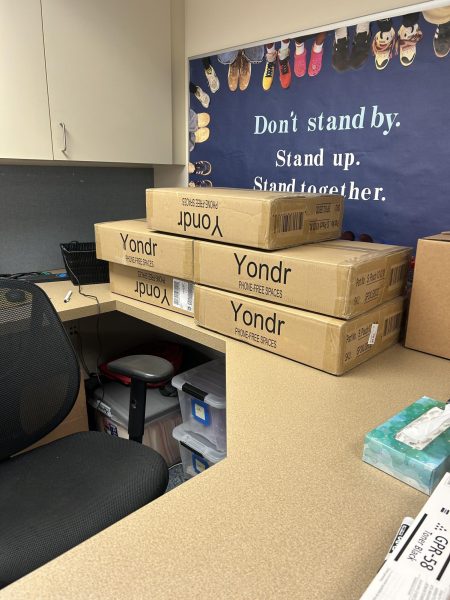
Sam Calandra-Jayne ‘26
Lock boxes like this one will be placed around campus for students to lock and unlock their Yondr pouches
This October, Abington Friends School will roll out a sweeping phone ban for upper school students using Yondr pouches. Yondr pouches have become increasingly popular in recent years, with an estimated 2 million students now using them, according to NBC News.
AFS is following in the footsteps of local prep schools, like Germantown Friends School and Haverford School, in implementing a phone-free policy through Yondr. According to the same NBC News article, six of the 10 largest school districts in the United States have decided to use Yondr to go phone free.
The decision to go phone free was researched by the Fourth Century Center, said the Director of the Fourth Century Center, Adena Dershowitz.
Dershowitz said, “We read different academic journals and articles about… cell phones in schools. We also spoke with other schools, and then we did community research. Students received surveys, faculty received surveys, and then there were two cell phone free days that were organized as experimental days to get a sense of the issues that would come up, potentially, if we were to move in [a cell phone free] direction.”
Brendon Jobs, Upper School Director, said, “We decided to go with [Yondr] ultimately because it sends a clear signal about what the expectation is.”
Jobs said, “It also offers us [a] program to plug into… the program being the pouch itself, but also ongoing support from the Yondr team.”
The Yondr system does come with a financial cost. Pouches cost $30 each, according to NBC. With 295 Upper School students at AFS, the total comes out to around $8850.
This cost is one of the biggest issues with the program, says Hannah Elkin ‘26, in a sentiment echoed by many.
“I’m personally very ticked off about the fact that we’ve spent so much money on Yondr pouches,” said Elkin.
When asked where the school should put this money instead, Elkin said, “Literally anything else… sports, theatre, clubs, renovations, literally anything else would be more useful.”
Jason Holloway ‘29 said, “There’s so many things the school could spend that [money] on rather than banning phones.”
Jobs took a different opinion, saying, “I don’t know a better investment than investing in folks leaning into explorer mode.” Jobs also noted the school’s willingness to invest in community life and a better experience for students.

On the subject of goals for banning cell phones, Jobs said, “This is what we [want]: more engagement in clubs, more engagement in student life, more presentness between students on campus.”
Elise Graber ‘26 thinks Yondr pouches will work to the school’s goal of becoming more engaged in student life, saying, “we’re practically forced to talk to each other if [we] don’t have [our phones] on [us]… it’s more of a matter of ‘I don’t have anything else to do.’”
Khalil Jimenez ‘27 takes a different opinion. “There is going to be a little more focus, but I don’t think it’s going to be the major change that they want,” said Jimenez.
Jobs referenced a survey from Yondr of more than 1,200 schools using the service, showing that schools using Yondr saw an 83% increase in “student engagement.” Other sources back this, with The Nation Fund reporting Yondr pouches “increased [students] communication and interaction with one another.”
Because of the aforementioned costs of the Yondr pouch system, it will likely be at least semi-permanent, said Tina Yen, Assistant Upper School Director. Yen said, “[Yondr] is definitely not something where we’re going to try it for a year, and be like, ‘okay, that didn’t work out.’”
But Yen also didn’t rule out a possible change in the future, saying, “The idea of a policy is that a policy isn’t set in stone. It should respond to the needs of the community.”
On the logistical side, the Yondr system works with a series of lock boxes set up around campus. These lock boxes have a device inside that can lock and unlock the Yondr pouches. They will be open when students arrive for school, then they will be locked until the day. At dismissal time, they will be reopened. There will also be devices to open pouches at points of exit, such as the front office and Nurse Rachel’s office.
The Yondr program will start this Monday, October 27. It is a big change marking a new beginning of a phone-free AFS. Jobs said, “I’m really nervous about this. And I think that nervousness is also tinged with excitement for what the possibilities are.”